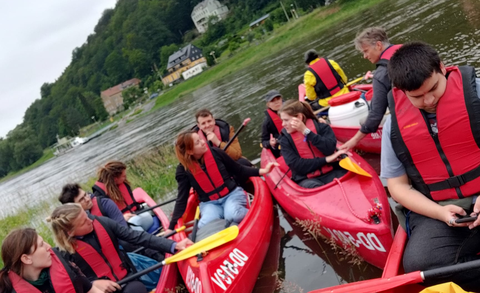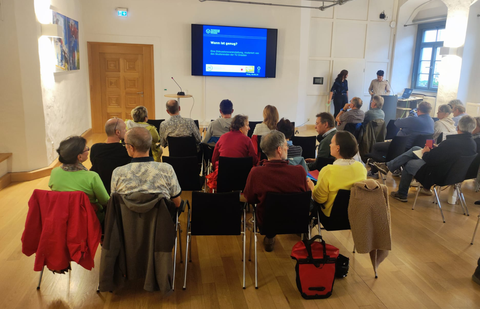Jun 24, 2024
Discourse on the Elbe river: TU Dresden teacher training students venture to discuss controversial topics
Twelve students and one professor were traveling along the Elbe bringing along a range of critical topics. They wanted to find out how speechless we really are in difficult situations. Are the differences in opinions insurmountable or can we use simple rules to learn how to start talking again?
The student teachers and their professor, Markus Tiedemann, Chair of Practical Philosophy and Didactics of Philosophy at TU Dresden, had been preparing for this unusual experiment for six months, since the beginning of the 2023 winter semester. To this end, the future ethics and philosophy teachers learned how to make a proper debate work and what de-radicalization techniques are available to them. On the other hand, the evenings also had to be well prepared in terms of content: The students studied specialist philosophical and political approaches to migration, climate change and the theory of a “just war”, wrote specialist papers on the topics and constantly monitored current developments.
From June 3 to 7, they put their knowledge and ideas to the test. The seminar group paddled along the Elbe from Königsstein to Torgau in canoes, stopping off in Pirna, Dresden, Meißen and Riesa. They offered the local communities and their residents an opportunity for discussion: an open debate on one of the controversial topics of migration, climate policy and war. MDR television covered the start of the excursion for the Sachsenspiegel news program.
The opportunities to talk were well received and, as expected, the discussions proved controversial and heated, but remained peaceful – also thanks to the rules of discussion that the students had defined in advance. All participants needed to remain objective, let others finish speaking, and refrain from being offensive. The “rule keepers” for the discussions were recruited from the audience, but did not have to become unduly active.
Markus Tiedemann and his students are pursuing a long-term goal with their open discussion approach: “We want to re-learn how to argue, and to do so using arguments rather than based on emotions.” The power of judgment is particularly important for this, says Tiedemann. He explains: “You have the power of judgment when you are able to appreciate arguments that do not correspond to your own position. That is also the core moment of de-radicalization." But how successful is this approach given the seemingly hardened fronts in the Saxon society?
“I actually think the seminar was a complete success in terms of training prospective teachers,” says Markus Tiedemann. “With regard to the societal impact, we would have liked to have seen even more visitors, but there were certainly people who came to reflect and enjoyed appreciating the arguments of the other side. Of course, we haven't converted everyone to democracy, but we have certainly been able to reach people."
The results of the elections on June 9 nevertheless make the professor pessimistic: “Given the current situation, we would actually need to send out a group like this from every university in Germany every week, whether in a canoe, on foot or by bike.”
The “Cross-Connections” project has not yet come to an end with the canoe trip: The students accompanied the discussion nights also on a scientific basis: During the coming winter semester, they will evaluate questionnaires and interviews with the visitors on site and make the collected data available to a project that is currently working on integrating ways to foster a culture of debate into the Saxon curriculum. And, of course, the future educators will teach their students and perhaps even their parents what they have learned as part of the project.
The "Querverbindungen" (cross connections) project is funded by the Federal Ministry of Education and Research (BMBF) and the Free State of Saxony as part of the Excellence Strategy of the Federal and State governments and the Society of Friends and Sponsors (GFF) of TU Dresden.
Contact:
Prof. Markus Tiedemann
Chair of Practical Philosophy and Didactics of Philosophy
TU Dresden
+49 351 463-32576


